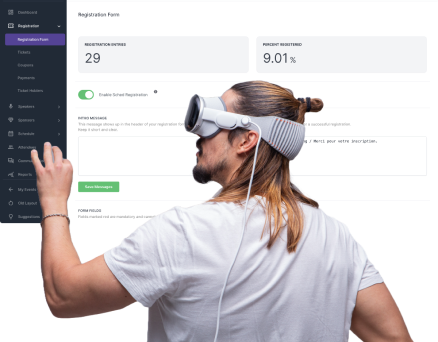Understanding how to measure the success of an event is crucial for organizers aiming to optimize future experiences.
Event KPIs are essential tools for this purpose, offering a structured way to evaluate various aspects of an event, such as financial performance and attendee engagement.
By effectively using these KPIs, organizers can make informed decisions that enhance future events and achieve strategic goals.
In this article, the discussion will center on key event KPIs and how they can be leveraged to accurately assess an event’s impact.
TL;DR
Table of contents
- 1 TL;DR
- 2 What Are Event KPIs?
- 3 Why You Should Set And Track Your KPIs For Events
- 4 Best Event Metrics To Track: 10 Top Event KPI Examples
- 5 10 Practical Tips For Managing Event Marketing KPIs
- 5.1 1. Define Objectives Clearly
- 5.2 2. Utilize an Event KPI Dashboard
- 5.3 3. Focus on Relevant Metrics
- 5.4 4. Set Benchmarks and Targets
- 5.5 5. Monitor Registration Conversion Rates
- 5.6 6. Measure Return on Investment (ROI)
- 5.7 7. Apply KPIs to Virtual Events
- 5.8 8. Analyze Cost per Acquisition
- 5.9 9. Feedback and Post-Event Surveys
- 5.10 10. Regular Review and Adjustment
- 6 Takeaways About Key Performance Indicators For Event Management
- 7 FAQs
Event KPIs are essential metrics that help measure the success and impact of an event.
-
- Include tracking form submissions, video views, and onboarding drop-offs to gather actionable insights about user behavior.
-
- Monitoring pipeline generation helps identify new opportunities, particularly in B2B events, by linking lead generation to projected revenue.
-
- Evaluating the cost per customer acquisition provides clarity on financial efficiency when acquiring new customers through events.
-
- KPIs deliver valuable data for performance measurement and strategic improvements, guiding decision-making for future events.
What Are Event KPIs?
Event KPIs (Key Performance Indicators) are measurable values that help event planners assess the success of an event. They offer critical insights into how well the event meets its goals.
These KPIs are tailored to reflect specific objectives, such as attendance, engagement, or financial outcomes.
Identifying the right KPIs is essential for planning and executing successful events.
Common Event KPIs
- Attendance Rate: Measures the number of attendees relative to the number of invitations sent.
- Audience Engagement: Evaluates attendee interaction through metrics like social media mentions or feedback forms.
- Cost per Customer Acquisition: Assess the financial efficiency of gaining new customers through event marketing.
Financial KPIs
Financial metrics often include gross profit, net profit, and the revenue from ticket sales. These figures are crucial for understanding the economic impact of an event.
Ticket Sales Data:
- Number of Tickets Sold: Categorized by type, including early bird, VIP, and virtual tickets.
- Average Tickets per Order: Helps analyze buying patterns.
Event KPI Importance
Event KPIs not only provide a snapshot of event performance but also guide strategic decision-making for future endeavors.
By focusing on key areas like attendee satisfaction or cost efficiency, planners can optimize resources and improve overall event quality.
Selecting the right mix of KPIs ensures a comprehensive evaluation of both short-term objectives and long-term goals.
Why You Should Set And Track Your KPIs For Events
Setting and tracking Key Performance Indicators (KPIs) for events is crucial for assessing success. KPIs for events provide measurable data points that help determine if goals are achieved. They guide strategic planning and enhance decision-making processes.
Event KPIs offer insights into various aspects, such as attendee satisfaction, engagement levels, and revenue generation. These metrics enable event organizers to understand the impact of their efforts accurately.
A list of common KPIs includes:
- Registrations & Ticket Sales
- Attendee Satisfaction Ratings
- Customer Acquisition Cost
- Lead Generation Metrics
Tracking these KPIs assists in fine-tuning marketing strategies, improving the attendee experience, and optimizing resource allocation.
KPIs serve as a communication tool with stakeholders.
By presenting concrete data, organizers can report on performance and demonstrate the value of their events clearly.
Analyzing KPIs allows for identifying trends and patterns. This knowledge aids in predicting future outcomes and setting realistic goals.
Event planners can use these insights to continually fine-tune their practices, ensuring long-term success.
Best Event Metrics To Track: 10 Top Event KPI Examples
Tracking event KPIs is crucial for evaluating success and planning future strategies. Here are ten key metrics to consider:
1. Registrations & Ticket Sales
Fundamental for any event, these numbers indicate audience interest and financial success.
2. Attendee Engagement
Analyzing likes, shares, comments, and mentions on social media channels provides insights into event engagement.
3. Cost per Customer Acquisition
Helps assess the financial efficiency of marketing strategies, particularly for companies focused on customer growth through events.
4. Event Check-In Rate
Percentage of registered participants who attend, useful for evaluating the event’s appeal and logistical efficiency.
5. Net Promoter Score (NPS)
Measures attendees’ satisfaction and likelihood to recommend the event, offering a snapshot of overall success.
6. Lead Generation & Conversion
Tracks the number of potential clients created and those who become actual customers, crucial for business-focused events.
7. Session Attendance
Provides data on which sessions were most popular, guiding content planning for future events.
8. Social Media Reach
Use of specific hashtags helps determine online visibility and audience interaction during the event.
9. Revenue Generated
Total income from ticket sales, sponsorships, and partnerships reflects the event’s financial viability.
10. Stakeholder Satisfaction
Feedback from event partners and sponsors determines collaborative success and future opportunities.
Each metric serves its purpose in providing a comprehensive understanding of an event’s performance. Properly tracked, these KPIs can enhance both in-person and virtual event outcomes.
10 Practical Tips For Managing Event Marketing KPIs
1. Define Objectives Clearly
Each event must have specific goals.
Identifying if the aim is brand awareness, lead generation, or engagement helps in selecting appropriate KPIs.
2. Utilize an Event KPI Dashboard
Centralize data with a dashboard to track metrics in real-time.
This allows for quick adjustments and informed decision-making.
3. Focus on Relevant Metrics
Choose metrics that align with event goals.
If measuring engagement, prioritize social shares and interaction rates.
4. Set Benchmarks and Targets
Establish clear benchmarks and targets.
This aids in evaluating the success of marketing efforts against predetermined expectations.
5. Monitor Registration Conversion Rates
Evaluate how many registrants actually attend.
A high conversion indicates effective pre-event marketing.
6. Measure Return on Investment (ROI)
Subtract event expenses from the total revenue to gauge financial success.
Total profit is a straightforward indicator here.
7. Apply KPIs to Virtual Events
For virtual events, focus on metrics like participation rates, session duration, and digital engagement.
8. Analyze Cost per Acquisition
Calculate the cost for acquiring each customer through the event.
This helps assess budget efficiency.
9. Feedback and Post-Event Surveys
Use surveys to gain insights into attendee satisfaction and areas for improvement.
10. Regular Review and Adjustment
Continually review KPIs and adjust strategies as needed.
This ensures alignment with evolving goals and challenges.
Takeaways About Key Performance Indicators For Event Management
Key Performance Indicators (KPIs) are vital tools in assessing event success. They provide measurable, quantitative data that help determine if objectives are achieved.
For event managers, understanding and selecting the right KPIs can enhance strategic planning and execution.
These indicators serve as a compass, guiding decisions that align with overarching goals.
FAQs
What are the best virtual event success metrics?
Virtual events have unique KPIs that help measure their success.
Engagement is a primary metric, assessing participation through session attendance, polls, and social media activity.
Another crucial metric is registration vs. attendance rate, indicating the effectiveness of promotional efforts.
Feedback and surveys provide insights into attendee satisfaction and areas for improvement.
Tracking the time spent on content allows organizers to evaluate how engaging their material is.
Lastly, analyzing the conversion rate of leads generated during the event offers invaluable data for future planning.
What are the three key phases in event evaluation?
Event evaluation consists of three critical phases: Pre-event, During-event, and Post-event.
In the pre-event phase, organizers define goals and determine KPIs that align with their objectives.
This stage is crucial for identifying specific targets and ensuring all necessary metrics are in place.
During the event, real-time data collection is essential for gauging ongoing performance.
This includes tracking attendee engagement, monitoring social media interactions, and collecting feedback through quick surveys.
In the post-event phase, analyzing collected data provides insights into the event’s success.
This stage focuses on interpreting the information gathered, generating reports, and making strategic recommendations for improvements in future events.









